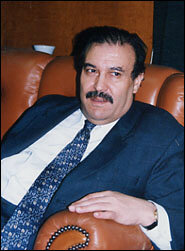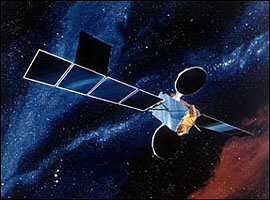
|

 Introduction - Privatization - Partnerships - Investment - Oil and Gas - Mining - Introduction - Privatization - Partnerships - Investment - Oil and Gas - Mining -
Electricity - Building for the future - Telecoms - Air and Sea - Private Sector - Finance -
Going Public - Image is everything - Tourism - Conclusion 
 TELECOMS: CATCHING UP TELECOMS: CATCHING UP |
With only 5% of the population equipped with a telephone, Algeria is ranked among the lowest countries in Africa in terms of telecom penetration. Poor phone connections, a limited cellular network and inefficient Internet connections have characterized the telecom sector until recently. Today the telecom sector represents a great hope for the modernization of Algeria - a crucial test for its transition towards a market economy. The development of the telecom sector is of prime importance to President Bouteflika, and to the government who called for World Bank assistance to successfully liberalize this sector. There are 7 million demands pending for telephone lines and about 700 000 for mobile phones.

There is great room for improvement, and serious reforms are planned; among the most significant ones, let's mention: the separation of postal services from telecommunications, the creation of a regulatory body for the telecommunications market, and the sale of a GSM license to an international operator.
Mohamed Maghlaoui, Minister of Postal Services and Telecommunications, started implementing a new telephone-number allocation program to increase connection capabilities, and to set up the framework for a new GSM network. He explains: "in 2002, we will open Algeria Telecom' s capital, a new company created in anticipation of the separation of the post and telecom systems. By the end of 2004, I expect the telecommunications market to be entirely open to competition."
The sale of the GSM license was the first test. Following an open tender process, Orascom Telecom won Algeria's first private GSM license on July 11th with a $737 million bid. Orascom Chairman, Naguib Sawiris, said his company would invest US$ 200 million in the next two years, and US$ 500 million over a five-year period. " We expect to become operational before February 2002 and, we are targeting 10 million subscribers by 2015 " stated Sawiris.
Now that the GSM license has been awarded, Moussa Mouselmal, General Manager of Alcatel (Algeria), will be looking at providing Orascom with the latest GSM technology and services. "Since we are not operators but equipment providers, what matters to us is to bring new Alcatel technology to Algeria, install it and supervise it."
"Algeria is a young country," adds Mouselmal "and although it needs 2 million GSM lines, it has only a maximum of 100 000. If we had these 2 million lines, they would be sold very easily. Algeria is an open country where a lot needs to be done, and at the moment, it needs 1 million fixed lines". Not only that, but "GSM technology must also acquire the necessary intelligence to be able to have prepaid phone cards, and fixed subscriptions ".
| It goes without saying that Alcatel(Algeria) is also working to entrench its participation in the country's telecom sector, perhaps through a local partnership with Sonatite, the local telecom equipment company.

However, a company that has already established a strong presence through a successful joint venture is Ericsson. After first coming to Algeria during the 1960s, Ericsson developed a foothold in the local market before signing in 1987 a joint venture with SITEL, Algeria's leading telecom equipment supplier. At that time the national telephone network was hopelessly out-of-date: in 1998, 70% of lines were still analogue while equipment and exchanges were obsolete.
The SITEL-Ericsson joint venture has certainly been fruitful, proving that Algerian success stories are not only limited to the hydrocarbons sector. "SITEL is a good example of a strong local partnership" states Karl Asmar Ericsson's Executive Vice President for Central & Eastern Europe, Middle East and Africa. "In fact, SITEL is one of the companies in Algeria where you can talk about state-of-the-art technology."
The success story is not over yet. "SITEL already delivered a system for about 100,000 customers, which is not enough because demand is much higher, so now it is now a question of increasing our investment. In general, Algeria's penetration rate is very low, and could be much higher if the conditions were right."
With this in mind, Ericsson is helping to build SITEL from a purely manufacturing to a service-oriented company, and preparing it for a competitive environment in fixed lines and GSM technologies. Although SITEL will no longer enjoy its monopolistic status to supply and develop Algeria's fixed phone network, "we have a very good position and a strong presence in the market" says Asmar. Moreover, he believes that Algerian telecom sector can only move upwards. "We see tremendous opportunities here... We are not only determined to move with the market, but to take pro-active initiatives to promote and stimulate the economy. The young Algerian population is quickly adopting new European trends, and we feel that we are in a position to quickly move forward and develop this market."
|
© World INvestment NEws, 2001.
This is the electronic edition of the special country report on Algeria published in Forbes Global Magazine. 12th November, 2001 Issue.
Developed by AgenciaE.Tv Communication |
|
|
| |
| | | |
|

